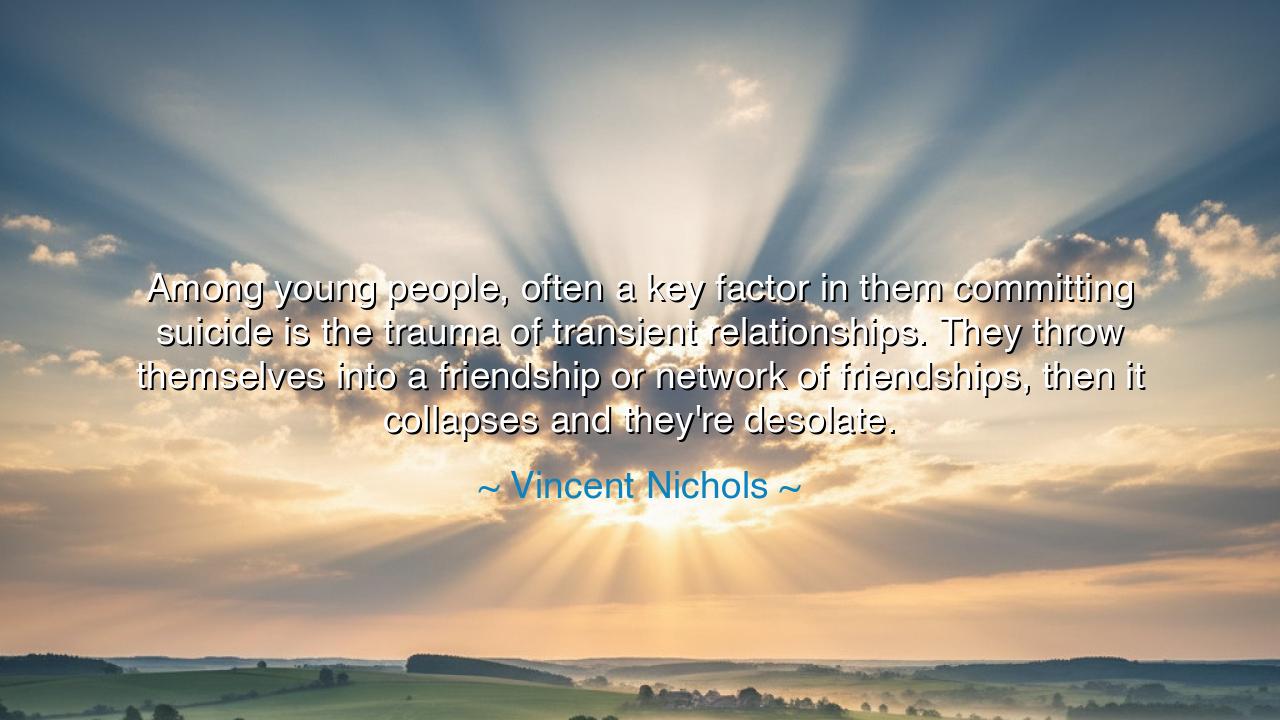
Among young people, often a key factor in them committing suicide
Among young people, often a key factor in them committing suicide is the trauma of transient relationships. They throw themselves into a friendship or network of friendships, then it collapses and they're desolate.






In the solemn and compassionate words of Vincent Nichols, a shepherd of souls in the modern age, we hear a truth that pierces the heart of our time: “Among young people, often a key factor in them committing suicide is the trauma of transient relationships. They throw themselves into a friendship or network of friendships, then it collapses and they’re desolate.” Here, the archbishop speaks not as a judge, but as one who grieves for the lost and the lonely. His words illuminate the sorrow of an age where human bonds, though abundant in number, are thin in depth — where hearts, hungry for connection, build fragile bridges of affection that crumble beneath the weight of neglect and impermanence.
The origin of this reflection lies in Nichols’s ministry to the youth of Britain, where he witnessed the silent epidemic of despair spreading among those who seem surrounded by friends yet remain profoundly alone. In a world of fleeting messages and digital communion, young hearts often mistake constant contact for true friendship. They pour themselves fully into connections that glow bright but burn out swiftly — connections that promise belonging, yet dissolve when tested. Nichols observed that when such bonds collapse, they do not merely end; they leave a void so vast that the soul, unable to bear the emptiness, loses its will to live. His words are not condemnation but lament — a plea for society to rediscover the ancient meaning of love, loyalty, and enduring companionship.
For transient relationships are not new to humankind, but their wounds have deepened in this age of haste. In every era, the young have sought friendship — that mirror in which they might see themselves reflected and affirmed. Yet today, many are taught to value immediacy over endurance, appearance over truth, pleasure over commitment. They “throw themselves” into friendship, as Nichols says, giving their hearts wholly and suddenly, before learning that the roots of real friendship grow slowly, nourished by time, trust, and shared suffering. When such premature bonds fall apart, they shatter not only the connection but the fragile self that depended upon it. Thus, the trauma of loss becomes more than sorrow; it becomes despair — the terrifying belief that one’s heart will never find a safe home.
The ancients knew this pain well and warned against it. In the Dialogues of Cicero, the Roman philosopher wrote that friendship must be built upon virtue, for only what is good can last. Friendships founded on impulse or pleasure, he said, vanish as quickly as they form, leaving behind the ache of emptiness. Likewise, Aristotle taught that there are three kinds of friendship: those of utility, those of pleasure, and those of goodness. The first two are fleeting — they end when the need or delight is gone. Only the third, grounded in mutual respect and moral strength, endures. Vincent Nichols’s words echo this same wisdom: that to heal the wounds of youth, we must teach them not merely to connect, but to cultivate. For what grows too fast often dies too soon.
A story may illuminate this further. In the late 19th century, the young Vincent van Gogh sought love and friendship with a ferocity born of loneliness. He yearned for connection, offering his soul to others with reckless trust — yet again and again, he was rejected or misunderstood. His friendships, intense and transient, collapsed under the strain of his inner turmoil. When his bond with the painter Paul Gauguin disintegrated, Van Gogh’s fragile heart could not bear it. Out of that despair came his famous act of self-mutilation, and later, his death. His life stands as both tragedy and testament: the human heart cannot survive long on impermanent affection. It needs constancy, honesty, and compassion — the enduring light of a friend who stays when all others fade.
Vincent Nichols’s insight, therefore, is not merely about the tragedy of suicide but about the deeper famine of our time — the famine of meaningful relationships. He warns that friendship, if treated as disposable, becomes a source of destruction rather than healing. The young, he reminds us, need not more connections, but truer ones; not more followers, but faithful companions. To give oneself fully to another is not wrong, but it must be done with wisdom — to those who will nurture, not exploit; who will stay, not flee. True friendship, like faith, requires both trust and patience.
So, my child, take this teaching into your heart: do not rush to call every bond friendship, nor give your heart to every passing smile. Seek friends whose love is rooted in truth, not convenience. Be yourself such a friend — steadfast, honest, and kind. When others fall, lift them; when they despair, remind them that love can endure. Build your relationships as the ancients built temples: stone by stone, with care and reverence. For only what is built upon sincerity will stand against the winds of life.
And remember this final lesson of Vincent Nichols: the loneliness of the age cannot be healed by more noise or faster friendship, but by the slow labor of love — by choosing to stay when others leave, to forgive when others forget, to listen when others speak only of themselves. Friendship, when true, becomes a sacred shelter for the soul. If the young learn this, they will not be desolate when the fleeting passes, for they will have discovered something eternal — the unbreakable bond between hearts joined in truth and compassion.






AAdministratorAdministrator
Welcome, honored guests. Please leave a comment, we will respond soon